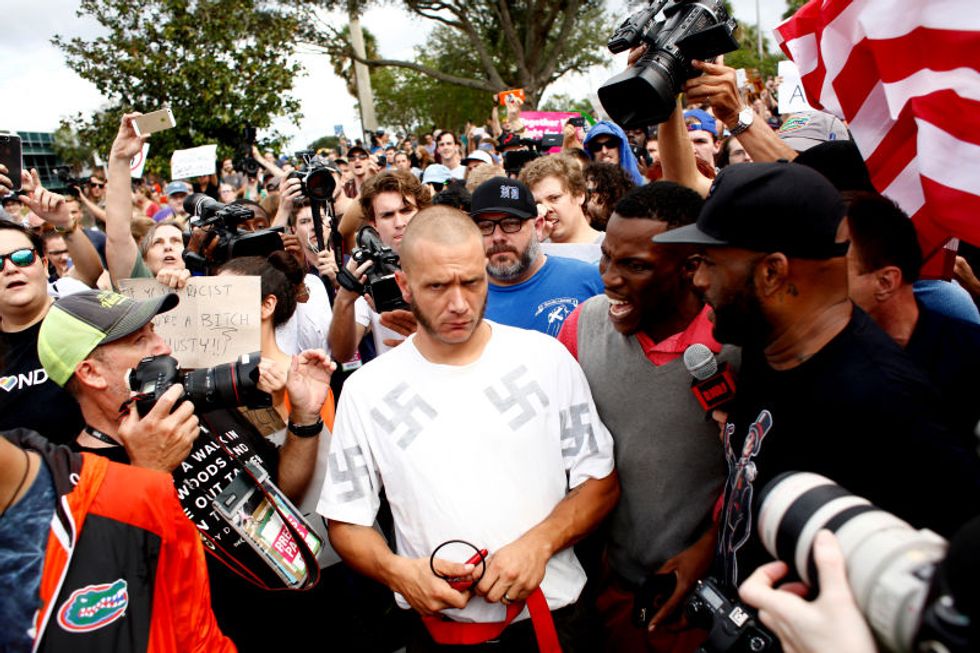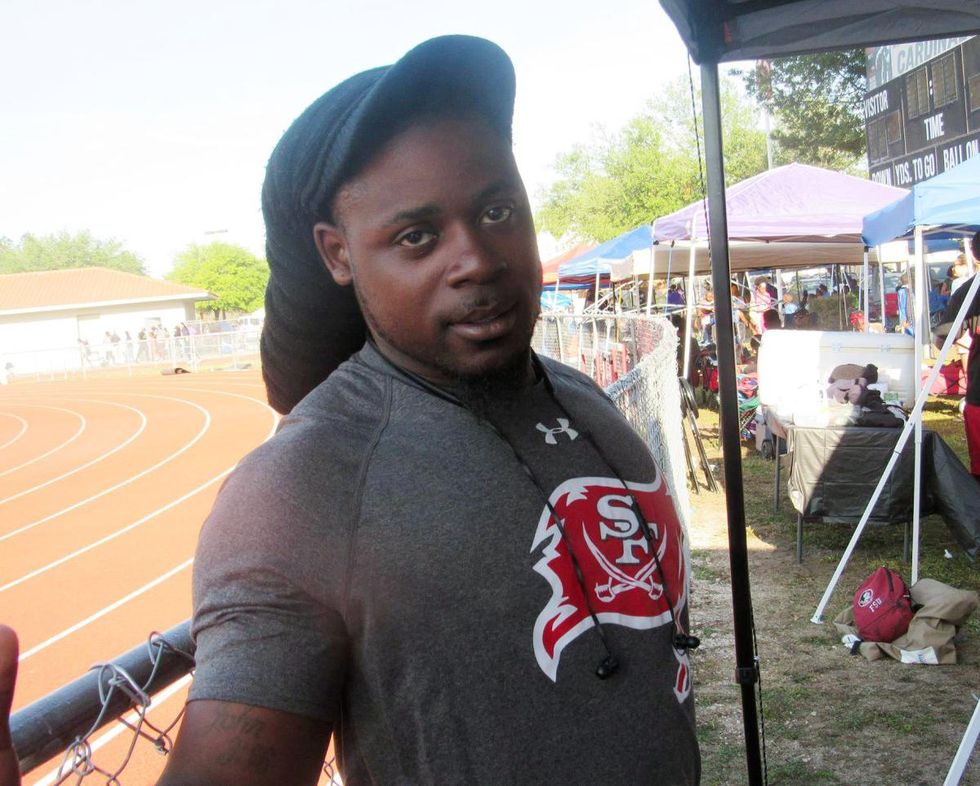
Last Thursday, White Supremacist leader Richard Spencer hosted another of his speeches in the University of Florida's Phillips Center for Performing Arts. But as exciting as Spencer's speech most assuredly was, something much more exciting happened just outside the building: a White Supremacist and a Black man ended up in full-frontal contact.
In the same space and timeframe shared by three men who shouted a Nazi salute just before threatening and shooting into a crowd of protestors, Black protestor Aaron Alex Courtney approached a white man named Randy Furniss who wore a t-shirt decorated with Swastikas.
According to Courtney, he asked Furniss, "Why do you hate me? What is it about me? Is it my skin color? My history? My dreadlocks?”
In a Twitter video posted by Politics 4 Dummies (@Politics4dum), Furniss can be seen avoiding eye contact with Courtney. Courtney reportedly pulled Furniss in for a hug and asked “Why don’t you like me, dog?”
According to Courtney, Furniss eventually hugged him back and replied, “I don’t know.”
A nazi and a black man.....America 2017 #SpencerAtUF pic.twitter.com/sSaG36EuOr
— Politics 4 Dummies (@Politics4dum) October 19, 2017
Several news sources have covered this unlikely encounter including the New York Daily News and Fox8 TV. But what you may not have heard just yet is how much a 30-second encounter between two undeniably different men can teach us.
Here are 5 things we learned outside of Richard Spencer’s White Supremacist Speech when a Black man asked, “Why don’t you like me, dog?"
1. Crave peace.
My first reaction to Aaron’s encounter was to question his motive. Why? Why would he even want to give a White Supremacist a hug? Here was Courtney, face to face with a man who— judging by the decorations on his shirt— had very few positive thoughts about people of color. But something drew Courtney in, compelled him to share space with Furniss and make contact.
I think that “something" was Courtney's appetite for peace.
He somehow found the strength to “turn away from evil and do good; [to] seek peace and pursue it” (Psalm 34:14 NIV). He wasn’t just concerned with an absence of trouble. What Courtney craved wasn’t just a stillness, a calm space around him. He wanted “shalom”. He wanted to bless Furniss with at least a small piece of perfection: the state of being where there is no blemish at all— no hatred and no selfish ambition.
2. Love your enemies.
But even though we know what compelled Courtney to lean in for a hug (i.e., his appetite for peace), we still don’t know what molded his heart the way it had been molded for Furniss. Yeah, Courtney may have wanted peace for Furniss, but what made him want peace in the first place?
In an interview with the New York Daily News, Courtney explained what made him crave peace: “Something in me said, ‘You know what? He just needs love. Maybe he never met an African-American like this.’”
Love. In Courtney's willingness to get close to his enemy, he taught us to love our enemies.
Courtney showed Furniss in just 30 seconds what 1 Corinthians 13 is all about. He was patient with Furniss— leaning in three times for understanding. He was kind to Furniss— refusing to repay his evil intentions toward him with evil. Aaron did not seek his own ambitions over the commitment to love. He did not hold Furniss’s wrongs against him.
Courtney hoped for Good to fall upon Furniss and he took the steps to bring it to fruition.
3. Seek understanding.
There is something powerful in the way Courtney approached Furniss. He could have approached him with one accusation after another, shouting in his face a list of the hateful things he’s undoubtedly thought about and done to people of color.
But he didn’t.
Courtney's first response was to ask him questions— to seek understanding.
One of the wisdom books of the Bible, Proverbs, says that the beginning of wisdom is to get understanding— no matter how costly it is. And for Courtney, understanding Furniss must have been expensive indeed. He admitted to the New York Daily News that his first response to Furniss was anger. “I could have hit him, I could have hurt him,” Courtney said. “After beating around the bush, and avoiding my questions, I asked him, I pleaded with him, I almost broke out in tears, growing increasingly angry because I didn’t understand.”
Courtney chose to be quick to listen and it cost him the chance to retaliate. Understanding was important enough for Courtney to forfeit his revenge.

4. Reconcile at all costs.
During Jesus’ 3-year ministry here on earth, He taught his disciples something what Courtney demonstrated beautifully during his encounter with Randy Furniss. Even if they were in the middle of offering hard-earned sacrifices at the altar of God and they remembered that someone had something against them, Jesus told them to drop what they were doing, go reconcile with the person with an ought against them, and then return to the altar to give their sacrifice to God.
How valuable must reconciliation be to God that Jesus would command that we pause the very act of worship for the sake of it? Is it worth forfeiting your otherwise justified hateful response to a man who hates you? Is it worth the risk of getting punched in the face by a White Supremacist in a Swastika t-shirt? Courtney must have known that reconciliation is worth that and so much more.
Passive forgiveness from afar is easy. But to get up and go to a person, seeking reconciliation for something they have an ought against you for— that takes real strength.
5. Mercy is risky.
In the Bible, there is a story about a good Samaritan’s act of mercy. By the time the Samaritan had stopped along the road from Jericho to Jerusalem to help a recently attacked and robbed man, he’d already been preceded by a priest and a temple worker. But they had considered the cost of approaching and helping a wounded man too high.
They passed him by, walking on the other side of the street.
The Samaritan and his community had long been despised by the Jerusalem Jews for their sub-par religiosity and mixed racial identity. They didn’t share Jerusalem’s views about the Jewish Canon and they had partially pagan ancestry.
But good Samaritan was obviously knit from noble enough fabric to extend beyond himself for the sake of others. His extension of love cost him two days worth of pay, a personal investment of oil and wine, and a commitment to whatever “extra expenses” the man accrued during his stay at the inn. He put his resources on the line. He stretched himself far beyond what was reasonable in the moment.
Like the Samaritan, Courtney chose mercy. Despite what Furniss thought about him, despite Furniss's assumption that Courtney was sub-par and inferior, Courtney chose to spare Furniss the consequences that would have otherwise come to him as retribution for his hatred for people of color. And Courtney's compassion could have cost him his life— considering that murders committed by White extremists are no rare thing. It could have cost him a punch in the face— Furniss may have still been confused about who punched him just moments before his encounter with Aaron. But Courtney still leaned in. He still extended himself far beyond what was reasonable.
And that was risky indeed.
Watching Courtney interact with a White Supremacist outside of Spencer’s speech beckons us toward introspection. Do we crave peace, love our enemies, seek understanding? Do we lean into the costs of reconciliation and mercy?
Every moment spent with people who are different-- or even hostile-- is an opportunity to answer most emphatically with a ‘yes’.
This article was originally published on vizionunited.com .
















